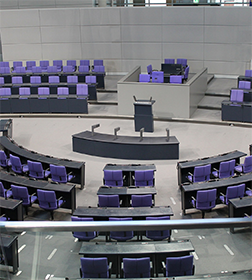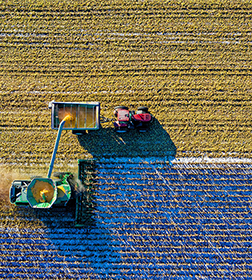Curriculum
Programme Structure
2022 Intake and onwards
| GDS Major Curriculum | Number of Courses: |
| GDS required course | x4 (12 credits) |
| Capstone project | x1 (6 credits) |
| GDS Concentration course^ | x5 (15 credits) |
| GDS Elective course# | x5 (15 credits) |
| Sub total: | 15 (48 credits) |
| University-required courses | Number of Courses: |
| Common Core | x4 (12 credits) |
| Cluster Course* | x3-5 (9-15 credits) |
| English Language | x4 (12 credits) |
| Chinese Language / Putonghua |
x2 (6 credits) |
| Free Elective | x9-11 (27-33 credits) |
| Sub total: | 24 (72 credits) |
TOTAL: 39 courses and 120 credits
# Courses from Lingnan and/or study-abroad institutions that complement their major programme interests and approved by Academic Adviser, with at least 1 course at the 3000-level or 4000-level.
^ Students are required to choose one of four Concentrations—’Policy and Institutions’; ‘Culture and Community’; ‘Business and Economy’; or ‘Human-Environment Interactions’, with at least 2 courses at the 3000- or 4000-level.
* Recommended to take 5 cluster courses. To enable GDS students to take courses under different concentration/electives areas when studying abroad, GDS students will have the flexibility to take a minimum of 3 cluster courses instead of 5.
For detailed recommednation of study path, please refer to the Programme Structure.
2020 and 2021 Intake
| GLA Major Curriculum | Number of Courses: |
| GLA required course | x4 (12 credits) |
| Capstone project | x1 (6 credits) |
| GLA study area elective course# | x10 (30 credits) |
| Sub total: | 15 (48 credits) |
| University-required courses | Number of Courses: |
| Common Core | x4 (12 credits) |
| Cluster Course* | x3-5 (9-15 credits) |
| English Language | x4 (12 credits) |
| Chinese Language / Putonghua |
x2 (6 credits) |
| Free Elective | x9-11 (27-33 credits) |
| Sub total: | 24 (72 credits) |
TOTAL: 39 courses and 120 credits
# Required to take 10 GLA elective courses across disciplines to form a coherent individualised path of study, with at least 3 at 4000-level. Completion of 4 GLA inter-disciplinary elective courses in a particular study area will qualify for a declaration of such concentration.
^ Recommended to take 5 cluster courses. To enable GLA students to take courses under different study areas when studying abroad, GLA students will have the flexibility to take a minimum of 3 cluster courses instead of 5.
For detailed recommednation of study path, please refer to the Programme Structure.
2019 Intake
| GLAP Major Curriculum | Number of Courses: |
| GLA required course | x5 (15 credits) |
| Capstone project | x1 (6 credits) |
| GLA study area elective courses# | x10 (30 credits) |
| Sub total: | 16 (51 credits) |
| University-required courses | Number of Courses: |
| Common Core | x4 (12 credits) |
| Cluster Course* | x3-5 (9-15 credits) |
| English Language | x4 (12 credits) |
| Chinese Language / Putonghua |
x2 (6 credits) |
| Free Electives | x9-11 (27-33 credits) |
| Sub total: | 24 (72 credits) |
TOTAL: 40 courses and 123 credits
# Required to take 10 GLA elective courses across disciplines to form a coherent individualised path of study, with at least 3 at 4000-level. Completion of 4 GLA inter-disciplinary elective courses in a particular study area will qualify for a declaration of such concentration.
^ Recommended to take 5 cluster courses. To enable GLA students to take courses under different study areas when studying abroad, GLA students will have the flexibility to take a minimum of 3 cluster courses instead of 5.
For detailed recommednation of study path, please refer to the Programme Structure.
Required Courses
2022 Intake and onwards
GDS1001 Interdisciplinary Inquiry for Global Challenges
This course provides students with skills and knowledge in two areas: (1) the purposes and challenges of academic inquiry that attends to global context and consequences, particularly with regards to development and sustainability issues; and (2) the process, structure, and tools of globally-informed research. Combined training in these two areas lays a foundation for students to succeed in advanced coursework, enabling them to employ global perspectives and methodologies in a range of academic disciplines.
GDS1002 International Development and Peace in the Global Age
This course aims at advancing two central goals of liberal education: critical thinking and global citizenship. For Lingnan graduates to compete effectively in a globalized world, they need to develop both the ability for critical thinking and a cosmopolitan global vision. Both skills are developd through analytical study of the international institutions, policies and partnerships that shape the modern world. The course begins with a review of the conceptual, theoretical and methodological perspectives of political-economy or the relations between state and market. The central concern of Political Economy involves the study of the reciprocal relationships between the state and the market, both nationally and globally. Among the topic discussed includes the evolution of the post-war liberal international economic order (1945-2020), including the relationship between major international organizations (the United Nations, the Bretton Woods Institutions (the World Bank, the IMF and GATT/WTO) and global governance. It examines how these organizations, including particular, international regimes have addressed pressing economic, 8 political, and security issues such as global economic cooperation, terrorism, proliferation of weapons of mass destruction, human rights, environment protection and rising global inequality. The challenges these organizations face and its implications for global order will also be examined. Students are expected to see not only the complex nature of these issues but also how they impact on us in Hong Kong. Combining traditional lectures and factual information, the course will also center around discussions, debates, and outside-classroom activities, which enhance students’ ability to critically evaluate world events.
GDS1003 Cultural Diversity and Community Well-Being
As a required Year 1 course in the Global Development and Sustainability programme, this course lays a foundation for students to develop global competency vis-à-vis the arts and humanities disciplines. It draws from multiple disciplines to provide students with a range of tools to analyze comparisons, contrasts, and connections in the world through the lens of the arts. In so doing, it trains students to think in two directions: how to use the arts disciplines to build healthy and inclusive communities and conversely, how to employ a global development and sustainability perspective to understand the arts fields. In touching on a wide range of arts disciplines—philosophy, religion, history, literary studies, language studies, cultural studies, performance studies, visual studies, music—it enables students to investigate any of these through the prism of global comparison, contrast, and connection. At the same time, the course demonstrates how the arts fields reveal the similarities and differences between world cultures and their dynamic interactions when in dialogue with one another.
GDS1004 Global Business and Sustainable Development
In the debate surrounding sustainable development, business (especially big business) has often been framed as the primary offender, held responsible for the current situation that the world finds itself in today. However, this ignores the fact that business has been a driving force behind many positive developments (including the move to achieving SG1 – ending poverty) and the reality that many other of the sustainable development goals can only be met through harnessing the resources, ingenuity and cooperation of the business world. This course examines how globalization has been driven by the world of business and the impact, both positive and negative, that global business is having on sustainable development.
GDS4000 Global Action: Capstone Project
This year-long six-credit capstone course enables students to integrate, articulate, advance, and present the totality of their learning in the four-year programme. Its central focus is the execution of an individual project, which will culminate in the production of an e-portfolio. The process and content of the course guides students to (a) integrate the local and global, the disciplinary and interdisciplinary, and the academic and the experiential aspects of their learning, in manner that demonstrates their global competencies and grasp of core development and sustainability issues; (b) apply their knowledge and skills to a substantial summative project; and (c) articulate and present their project ideas through written, oral, and e-technology formats. The various components of the course empower students not only toproduce a capstone project but to confidently coalesce and apply the totality of theirexperience to competently embark on their post-university work and life.
2021 Intake
GLA1003 Global Inquiry and Research
This course provides students with skills and knowledge in two areas: (1) the purposes and challenges of academic inquiry that attends to global context and consequences; and (2) the process, structure, and tools of globally-informed research. Combined training in these two areas lays a foundation for students to succeed in advanced coursework, enabling them to employ global perspectives and methodologies in a range of academic disciplines.
GLA1004 Global Perspectives from the Arts
This course lays a foundation for students to develop global competency vis-à-vis the arts and humanities disciplines. It draws from multiple disciplines to provide students with a range of tools to analyze comparisons, contrasts, and connections in the world through the lens of the arts. In so doing, it trains students to think in two directions: how to use the arts disciplines to explore world dynamics and world areas, and conversely, how to employ a global perspective to understand the arts fields. In touching on a wide range of arts disciplines—philosophy, religion, history, literary studies, language studies, cultural studies, performance studies, visual studies, music—it enables students to investigate any of these through the prism of global comparison, contrast, and connection. At the same time, the course demonstrates how the arts fields reveal the similarities and differences between world cultures and their dynamic interactions when in dialogue with one another.
GDS1002 International Development and Peace in the Global Age
This course aims at advancing two central goals of liberal education: critical thinking and global citizenship. For Lingnan graduates to compete effectively in a globalized world, they need to develop both the ability for critical thinking and a cosmopolitan global vision. Both skills are developd through analytical study of the international institutions, policies and partnerships that shape the modern world. The course begins with a review of the conceptual, theoretical and methodological perspectives of political-economy or the relations between state and market. The central concern of Political Economy involves the study of the reciprocal relationships between the state and the market, both nationally and globally. Among the topic discussed includes the evolution of the post-war liberal international economic order (1945-2020), including the relationship between major international organizations (the United Nations, the Bretton Woods Institutions (the World Bank, the IMF and GATT/WTO) and global governance. It examines how these organizations, including particular, international regimes have addressed pressing economic, 8 political, and security issues such as global economic cooperation, terrorism, proliferation of weapons of mass destruction, human rights, environment protection and rising global inequality. The challenges these organizations face and its implications for global order will also be examined. Students are expected to see not only the complex nature of these issues but also how they impact on us in Hong Kong. Combining traditional lectures and factual information, the course will also center around discussions, debates, and outside-classroom activities, which enhance students’ ability to critically evaluate world events.
GDS1004 Global Business and Sustainable Development
In the debate surrounding sustainable development, business (especially big business) has often been framed as the primary offender, held responsible for the current situation that the world finds itself in today. However, this ignores the fact that business has been a driving force behind many positive developments (including the move to achieving SG1 – ending poverty) and the reality that many other of the sustainable development goals can only be met through harnessing the resources, ingenuity and cooperation of the business world. This course examines how globalization has been driven by the world of business and the impact, both positive and negative, that global business is having on sustainable development.
GDS4000 Global Action: Capstone Project
This year-long six-credit capstone course enables students to integrate, articulate, advance, and present the totality of their learning in the four-year programme. Its central focus is the execution of an individual project, which will culminate in the production of an e-portfolio. The process and content of the course guides students to (a) integrate the local and global, the disciplinary and interdisciplinary, and the academic and the experiential aspects of their learning, in manner that demonstrates their global competencies and grasp of core development and sustainability issues; (b) apply their knowledge and skills to a substantial summative project; and (c) articulate and present their project ideas through written, oral, and e-technology formats. The various components of the course empower students not only toproduce a capstone project but to confidently coalesce and apply the totality of theirexperience to competently embark on their post-university work and life.
2020 Intake
GLA1003 Global Inquiry and Research
This course provides students with skills and knowledge in two areas: (1) the purposes and challenges of academic inquiry that attends to global context and consequences; and (2) the process, structure, and tools of globally-informed research. Combined training in these two areas lays a foundation for students to succeed in advanced coursework, enabling them to employ global perspectives and methodologies in a range of academic disciplines.
GLA1004 Global Perspectives from the Arts
This course lays a foundation for students to develop global competency vis-à-vis the arts and humanities disciplines. It draws from multiple disciplines to provide students with a range of tools to analyze comparisons, contrasts, and connections in the world through the lens of the arts. In so doing, it trains students to think in two directions: how to use the arts disciplines to explore world dynamics and world areas, and conversely, how to employ a global perspective to understand the arts fields. In touching on a wide range of arts disciplines—philosophy, religion, history, literary studies, language studies, cultural studies, performance studies, visual studies, music—it enables students to investigate any of these through the prism of global comparison, contrast, and connection. At the same time, the course demonstrates how the arts fields reveal the similarities and differences between world cultures and their dynamic interactions when in dialogue with one another.
GLA2001 Globalisation: Social Sciences Perspective
Part I- Political Economy in the Global Age
This course begins with a review of the conceptual, theoretical and methodological perspectives on the state and market, followed by an examination of how state and market interactions have shaped the post-war global political economy. Section one of the course provides a broad survey of the field of International Political Economy (IPE) as it has evolved in the post-war period. The central concern of IPE involves the study of the reciprocal relationships between the state and the market or politics and economics, both nationally and globally, in particular, the roots of the subprime-induced global financial crisis and the Great Recession of 2007-09; what explains the fast-moving contagion, the role of the U.S. Federal Reserve and Treasury and other central banks, the nature and implications of the massive government bailout, the Bush and the Obama Administrations' policy responses, and the debates it has generated regarding states and markets (state capitalism vs. American-style free-market neoliberal capitalism).
Part II- Development and Society in the Global Age
Section two of the course critically examines how the growing impact of globalization has affected social development and society across different parts of the globe. Particular attention will be given to examine how nation states respond to ideology of neoliberalism by transforming the way they manage the social and cultural developments. Largely student-centered, this section is structured around student-guided discussions of assigned readings, with the goal of encouraging the drawing of conclusions about important social issues from the comparison of different cases, such as the massification of higher education, youth unemployment, youth transitions and social mobility. Through preparation for discussions, organizing group presentations and completing written assignments, students will develop independent inquiry skills to explore the interrelationships between education and social policy and social phenomena. More specifically, this section will critically examine the following issues:
- How social and cultural development has been affected by the growing trends of globalisation?
- What major problems and challenges that globalisation has brought to the contemporary society?
- What major policies and strategies that the governments in the West and the East have adopted in managing rapid social, economic, political and cultural changes in order to enhance their global competitiveness?
- What new forms of social policy and governance are emerging as a consequence of this change process?
In order to enhance students' understanding of how globalization has affected different aspects of development across different parts of the globe, this section will begin by discussing major contextual variables causing policy changes not only from global but also regional and local perspectives. The core of this section will devote to identifying major change patterns emerging from the societies based in East Asia, with particular reference to critical reflections on how governments in these societies have tried to manage rapid changes in response to global, regional and local forces.
GLA2003 Global Business and Management
This course examines the changing world of international business and the impact that globalization has had on the amount and the nature of international trade and investment. It also considers the impact of continuing globalization on the growth strategies of multinational corporations and how they conduct their international business activities
GDS4000 Global Action: Capstone Project
This year-long six-credit capstone course enables students to integrate, articulate, advance, and present the totality of their learning in the four-year programme. Its central focus is the execution of an individual project, which will culminate in the production of an e-portfolio. The process and content of the course guides students to (a) integrate the local and global, the disciplinary and interdisciplinary, and the academic and the experiential aspects of their learning, in manner that demonstrates their global competencies and grasp of core development and sustainability issues; (b) apply their knowledge and skills to a substantial summative project; and (c) articulate and present their project ideas through written, oral, and e-technology formats. The various components of the course empower students not only toproduce a capstone project but to confidently coalesce and apply the totality of theirexperience to competently embark on their post-university work and life.
2019 Intake
GLA1001 Transpacific Literature in a Global World
This course looks at the Pacific as the primary location for literary, historical, and racial imagination since the Age of Exploration. It studies the crisscrossing, transpacific field of inscriptions ranging from Captain Cook to Herman Melville, Mark Twain, Jack London, Maxine Hong Kingston, and Theresa Cha.
GLA1002 Global Business and Management
This course examines the changing world of international business and the impact that globalization has had on the amount and the nature of international trade and investment. It also considers the impact of continuing globalization on the growth strategies of multinational corporations and how they conduct their international business activities
GLA1003 Global Inquiry and Research
This course provides students with skills and knowledge in two areas: (1) the purposes and challenges of academic inquiry that attends to global context and consequences; and (2) the process, structure, and tools of globally-informed research. Combined training in these two areas lays a foundation for students to succeed in advanced coursework, enabling them to employ global perspectives and methodologies in a range of academic disciplines.
GLA2001 Globalisation: Social Sciences Perspective
Part I- Political Economy in the Global Age
This course begins with a review of the conceptual, theoretical and methodological perspectives on the state and market, followed by an examination of how state and market interactions have shaped the post-war global political economy. Section one of the course provides a broad survey of the field of International Political Economy (IPE) as it has evolved in the post-war period. The central concern of IPE involves the study of the reciprocal relationships between the state and the market or politics and economics, both nationally and globally, in particular, the roots of the subprime-induced global financial crisis and the Great Recession of 2007-09; what explains the fast-moving contagion, the role of the U.S. Federal Reserve and Treasury and other central banks, the nature and implications of the massive government bailout, the Bush and the Obama Administrations' policy responses, and the debates it has generated regarding states and markets (state capitalism vs. American-style free-market neoliberal capitalism).
Part II- Development and Society in the Global Age
Section two of the course critically examines how the growing impact of globalization has affected social development and society across different parts of the globe. Particular attention will be given to examine how nation states respond to ideology of neoliberalism by transforming the way they manage the social and cultural developments. Largely student-centered, this section is structured around student-guided discussions of assigned readings, with the goal of encouraging the drawing of conclusions about important social issues from the comparison of different cases, such as the massification of higher education, youth unemployment, youth transitions and social mobility. Through preparation for discussions, organizing group presentations and completing written assignments, students will develop independent inquiry skills to explore the interrelationships between education and social policy and social phenomena. More specifically, this section will critically examine the following issues:
- How social and cultural development has been affected by the growing trends of globalisation?
- What major problems and challenges that globalisation has brought to the contemporary society?
- What major policies and strategies that the governments in the West and the East have adopted in managing rapid social, economic, political and cultural changes in order to enhance their global competitiveness?
- What new forms of social policy and governance are emerging as a consequence of this change process?
In order to enhance students' understanding of how globalization has affected different aspects of development across different parts of the globe, this section will begin by discussing major contextual variables causing policy changes not only from global but also regional and local perspectives. The core of this section will devote to identifying major change patterns emerging from the societies based in East Asia, with particular reference to critical reflections on how governments in these societies have tried to manage rapid changes in response to global, regional and local forces.
GLA3001 Critical Visual and Media Studies
This is a course on studies of visual culture and media as a contemporary form of social and political expression. We examine various forms of moving images and their relations to culture and politics. We focus on how film and digital media may carry specific meanings, and might be used as vehicles of power and persuasion. We will also trace the development of modern image cultures and examine how they frame contemporary social and political experience and thinking. At the end of the course, students should be able to make sense of the selected digital artworks and their relations to the larger context of contemporary culture and politics.
GDS4000 Global Action: Capstone Project
This year-long six-credit capstone course enables students to integrate, articulate, advance, and present the totality of their learning in the four-year programme. Its central focus is the execution of an individual project, which will culminate in the production of an e-portfolio. The process and content of the course guides students to (a) integrate the local and global, the disciplinary and interdisciplinary, and the academic and the experiential aspects of their learning, in manner that demonstrates their global competencies and grasp of core development and sustainability issues; (b) apply their knowledge and skills to a substantial summative project; and (c) articulate and present their project ideas through written, oral, and e-technology formats. The various components of the course empower students not only toproduce a capstone project but to confidently coalesce and apply the totality of theirexperience to competently embark on their post-university work and life.
GDS Curriculum
GDS Students must choose one of four Concentrations and complete 15 credits of coursework in the chosen Concentration. A minimum of two courses must be at the 3000- or 4000-level.




Electives
Students are also required to select 15 credits of courses from Lingnan and/or study-abroad institutions that complement their major programme interests. Course choices must be proposed to and approved by the student’s academic adviser. A minimum of one course must be at the 3000-level or 4000-level. Courses may include, but are not limited to:
- a. Introductory or prerequisite courses for chosen focus areas
- b. Relevant cluster courses
- c. Technical, methodological and/or advanced courses to further a specific expertise
- d. Language, culture and politics courses in a particular world area
- e. Courses not already taken within the chosen Concentration
- f. Courses from the other (not-chosen) Concentration areas
- g. Relevant credit-bearing internships or service-learning projects
Please refer to Programme Structure for the indicative course list of each study area.
GDS students can make use of the free elective credits to take a Minor Programme.
GLA CURRICULUM
Students are required to select 10 courses, at least 1 course from each study area, to form a coherent individualised path of study in consultation with their academic adviser. Of the 10 courses taken, at least 3 must be at the 4000-level.
Completion of 4 GLAP inter-disciplinary elective courses in a particular study area will qualify for a declaration of such concentration in:




Please refer to Programme Structure for the indicative course list of each study area.
GLA students can make use of the free elective credits to take a Minor Programme.


